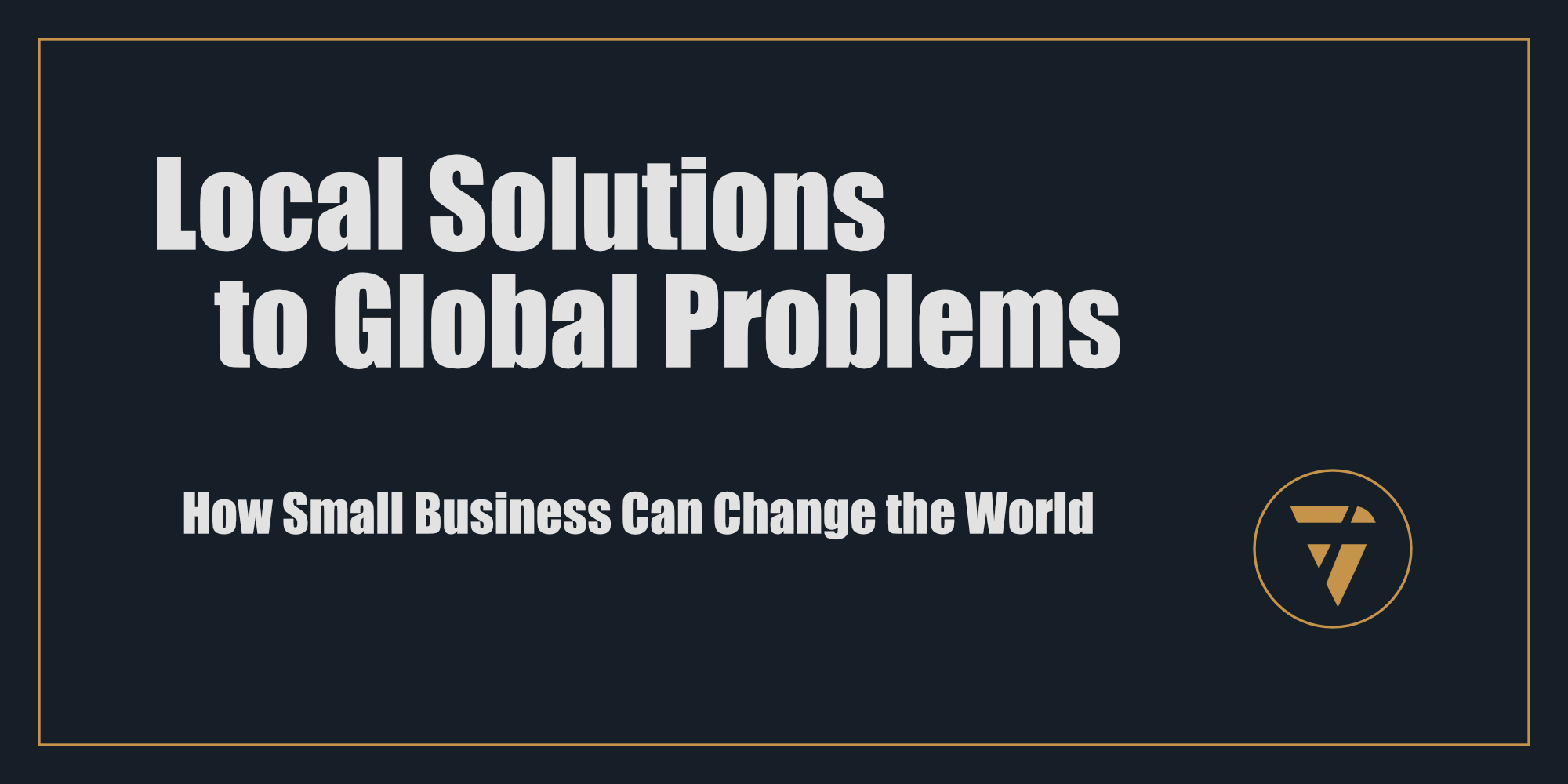Local Solutions to Global Problems

How Small Business Can Change the World
The global economy is broken, but we can fix it from the ground up.
For decades, economic growth was defined by expansion, scale, and centralization. The assumption was that larger corporations, more complex supply chains, and consolidated industries would drive efficiency and prosperity. Instead, this model has left communities vulnerable.
When global supply chains break, local businesses step in. When large corporations abandon communities in pursuit of greater margins, small enterprises rebuild what was lost. When people seek stability in uncertain times, it is not distant institutions that sustain them, it's their local economy.
The future of economic resilience is not bigger, but closer. Local businesses are not just economic entities; they are stabilizers, innovators, and catalysts for systemic change.
Why Local Businesses Matter More Than Ever
In an era of increasing global volatility, local economies are the foundation of a sustainable future. They provide:
- Greater financial stability by keeping capital within communities.
- More equitable economic structures by distributing ownership.
- Faster adaptation to crises by being responsive to real-world conditions.
A resilient economy is not built on dependence, but on decentralized strength. Local businesses offer that strength by prioritizing community over unchecked expansion.
The Local Wealth Effect: Keeping Money Where It Matters
Large corporations operate on an extractive model, profits flow to shareholders, often far removed from the communities generating those profits. In contrast, local businesses cycle wealth back into their immediate economy.
For every dollar spent at a local business, significantly more stays within the community compared to money spent at a corporate chain. The impact is direct:
- More jobs are created and sustained.
- Local governments collect more tax revenue, funding infrastructure and services.
- The economic base diversifies, reducing dependence on a few major employers.
A strong local economy creates a reinforcing cycle: capital remains within the community, investment increases, and economic security improves.
Local Businesses as Engines of Innovation
Innovation is often associated with large corporations, but true progress happens at the local level. Small businesses, driven by necessity and proximity to their customers, create solutions tailored to their communities.
Examples of local innovation include:
- Small-scale manufacturers reducing supply chain dependencies by producing locally.
- Independent grocers prioritizing regional food systems over global distribution networks.
- Community-driven financial models, such as cooperative banking and peer-to-peer lending, reducing reliance on centralized institutions.
While corporate-led innovation often prioritizes efficiency and profit extraction, local businesses innovate in ways that directly enhance quality of life.
Resilience in the Face of Crisis
Global crises expose the fragility of large-scale economic models. The COVID-19 pandemic demonstrated how overextended supply chains, financial speculation, and corporate consolidation fail under stress.
In contrast, communities with strong local economies recovered faster. Businesses that relied on local suppliers were less affected by global shortages. Locally owned financial institutions provided support when large banks retreated.
Economic decentralization is not just a preference—it is a necessity for stability in a world of increasing uncertainty.
Decentralization as an Economic and Political Imperative
Economic power is political power. When wealth is concentrated in multinational corporations, decision-making follows, leading to policies that prioritize corporate interests over public good.
Local businesses offer an alternative:
- Economic control remains within the community, leading to policies that reflect local needs.
- Small business ownership fosters civic engagement, as local entrepreneurs have a direct stake in policy decisions.
- Financial independence from large institutions reduces vulnerability to external shocks.
Decentralization is not inefficiency—it is the foundation of a more stable, equitable economic system.
Building a Future Where Local Wins
Rethinking Growth
Economic success must be redefined. Growth should not mean endless expansion, but increased stability, stronger community ties, and long-term viability. A business that provides sustainable employment and reinvests locally is more valuable than one focused solely on market share.
Investing in Local Capital Systems
For local businesses to thrive, they need access to capital. The traditional financial system prioritizes high-growth, high-return investments, often excluding small enterprises. Solutions include:
- Community investment funds that pool local capital for reinvestment.
- Public banking models that prioritize regional economic development.
- Co-operative ownership structures that allow employees and residents to build shared wealth.
Strengthening Business Networks
Small businesses are stronger together. By forming strategic partnerships, they can:
- Share resources to reduce costs.
- Expand into new markets while maintaining local control.
- Support industry-wide resilience against economic downturns.
Collaboration is a growth strategy, not a compromise.
Consumer Responsibility
Markets respond to demand. Every purchasing decision is a vote for the type of economy that will emerge. Shifting spending from corporate chains to local businesses strengthens economic independence and resilience.
Consumers have the power to:
- Prioritize businesses that invest in their community.
- Support ethical enterprises that treat workers fairly.
- Reduce reliance on monopolistic corporations that prioritize shareholder value over long-term stability.
A Decentralized Future Is the Only Path Forward
The failures of centralized economic systems are evident. The solution is not to wait for change from the top but to build strength from the ground up. Local businesses, operating in networks of mutual support, are the foundation of a future that is more stable, more democratic, and more resistant to global shocks.
Economic resilience will not be dictated by multinational corporations or distant policymakers. It will be built in local shops, independent farms, and community financial institutions.
The choice is clear: continue down a path of fragile centralization or invest in the strength of decentralized, community-driven economies. The latter is the only sustainable future.
What Comes Next
If you are a small business owner, community investor, or engaged consumer, your actions shape the future. The next steps are clear:
- Invest locally.
- Build networks of economic resilience.
- Redefine success beyond scale.
A world built on local strength is not an abstraction. It is a choice that can be made today. The question is whether we will make it.
This is what I’m working on. Tell me what you think, I enjoy the conversation! Subscribe and follow the work in real time.
Thanks!
B
Local economies aren’t weak alternatives to global markets, they’re the foundation of real resilience.
Every dollar spent at a small business is an investment in independence.
The future isn’t corporate consolidation; it’s decentralized, community-driven wealth.
PS -

Need a plan for economic resilience in your community?







